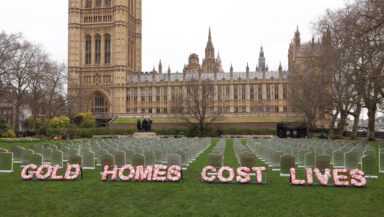London, Wednesday 13 March – Greenpeace activists turned a Royal Park outside the Houses of Parliament into a cemetery this morning warning the government that its failure to insulate people’s homes is costing thousands of lives.
Hundreds of headstones made from insulation boards have been erected outside the Palace of Westminster to highlight the “needless and shocking” loss of life that failed government policy on energy efficiency is causing.
Pictures and videos of the action can be found here.
The protest comes as a new analysis of official data, published today by Greenpeace UK, reveals that, on average, 58 people have died every single day during winter due to cold homes, since the Conservative government drastically cut support for home insulation measures in 2013 [1].
The research estimates that more than 70,000 excess winter deaths were caused by living in cold, damp housing conditions over the last ten years, since David Cameron – who was Prime Minister at the time – decided to ‘cut the green crap’ in 2013.
This decision, which slashed subsidies for loft and wall insulation, resulted in a cliff edge for government funded energy efficiency installations, which fell – in just one year – by almost 90%, from 2.3 million in 2012 to just over 300,000 in 2013 [2].
Over the past ten years, despite cold homes continuing to result in this needless loss of life, subsequent Conservative governments have failed to reinstate enough funding and government backed energy efficiency installations have continued to fall, with just 160,000 installed in 2022 [3].
This morning’s protest in Victoria Tower Gardens saw activists install hundreds of headstones outside Parliament, made from insulation boards engraved with: ‘Dedicated to the 70,463 people who died avoidable deaths in cold homes’ and other messages highlighting the scandal. An eight metre long funeral wreath message reading, ‘Cold Homes Cost Lives’ was laid in front of the headstones.
Paul Morozzo, Greenpeace UK’s fuel poverty campaigner, said:
“Thousands of people are literally freezing to death in their own homes during winter. And not only have successive governments failed to prevent this needless and shocking loss of life but they have fuelled this silent public health crisis by slashing insulation funding and failing to deliver a proper scheme to upgrade our cold, damp, draughty homes.
“This persistent failure to protect lives in one of the easiest ways possible is also driving the rise in fuel poverty, the cost of living and climate crises – since well insulated homes cost less to heat and cut carbon emissions. Cold homes cost lives and we urgently need a government willing to invest at least £6 billion every year to end this national scandal once and for all.”
The UK has the least energy-efficient housing in Western Europe, which – as well as contributing to thousands of deaths every year – means high energy bills for low-income households and is a key contributor to fuel poverty. Government figures released last month show that there are currently 3.17 million households living in fuel poverty in the UK.
Poorly insulated homes also contribute to the poor health of many people forced to live in cold homes and are estimated to cost the NHS more than £850 million a year in England.
Housing is also directly responsible for around 14% of the UK’s total greenhouse gas emissions, driven, in part, by the large proportion of uninsulated or poorly insulated homes. A national retrofit insulation scheme is therefore essential for tackling the climate crisis and meeting the legal-binding target of net zero emissions by 2050.
Representatives from Fuel Poverty Action also attended this morning’s protest at Parliament to demand the government provide more funding for home insulation, lower people’s bills and tackle fuel poverty.
Stuart Bretherton, Fuel Poverty Action’s Energy For All Campaign Coordinator, said: “Countless avoidable deaths under this government prove that it was true then as it is now, green policies are a necessity to reducing poverty and driving improvements to social wellbeing.
“The next government must set its ambitions high in delivering safe, non-toxic, non-flammable insulation appropriate for our homes; installed by well trained workers.
“Repairing and retrofitting the UK’s housing stock could prevent further loss of life, create thousands of skilled jobs and vastly reduce energy wastage for households bringing down emissions and our bills.”
Greenpeace is calling on the government to invest at least £6 billion of public funds annually over 10 years to deliver a national home retrofit programme and introduce regulations to significantly improve the energy efficiency of private rented-sector and social housing.
The Labour Party had previously pledged to invest the £6 billion a year that Greenpeace is calling for, but recently scaled back its spending plans for insulating homes by over 70%. Greenpeace is demanding that the Labour Party reinstates its previous spending commitments in its upcoming election manifesto.
The insulation boards used to create the cemetery in today’s protest will all be reused in a retrofit project to insulate a home.
ENDS
Contact:
Phil Richards – Press Officer – phil.richards@greenpeace.org or 07944 244 076
Greenpeace UK Press Office – press.uk@greenpeace.org or 07500 866 860
Notes to editor:
Pictures and footage available here
1. Deaths attributed to cold homes since government insulation subsidies were cut in 2013:
| Year | Deaths |
| 2013/2014 | 4,029.75 |
| 2014/2015 | 10,076.84 |
| 2015/2016 | 5,537.76 |
| 2016/2017 | 7,951.02 |
| 2017/2018 | 9,879.90 |
| 2018/2019 | 4,326.12 |
| 2019/2020 | 264.45 |
| 2020/2021 | 15,521.71 |
| 2021/2022 | 3,603.51 |
| 2022/2023 | 9,272.20 |
| TOTAL | 70,463.24 |
| Av deaths per year 2013-2022 | 7046 |
| Avg deaths per (winter) day | 58 |
The analysis used the recently published UK-wide ONS monthly death registrations data (see table 4) and applied the ONS winter mortality methodology* to calculate winter mortality for each year 2013-2023. The analysis then applies the UCL Institute of Health Equity methodology to estimate the number of winter deaths caused by living in cold homes.
* ONS winter mortality methodology: Winter mortality compares the number of deaths that occurred in the winter period (December to March) with the average of the non-winter periods (the preceding August to November and following April to July).
The ONS has recently published a new methodology for estimating excess deaths, however the methodology for estimating winter mortality is currently being reviewed following a consultation and has not yet been published.
2. The Climate Change Committee’s analysis of official government data shows that 2,331,000 government funded fabric efficiency measures were installed in 2012. This fell to 322,153 in 2013 (see Figure 5.5).
3. The Department for Energy Security and Net Zero’s latest Household Energy Efficiency Statistics are incomplete for 2023. They show that 161,557 energy efficiency measures were installed through the government’s ECO4 scheme in 2022 (see Table 1.1).



